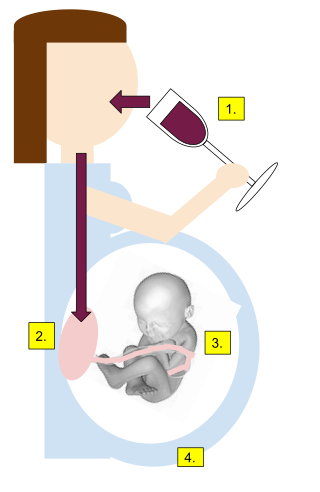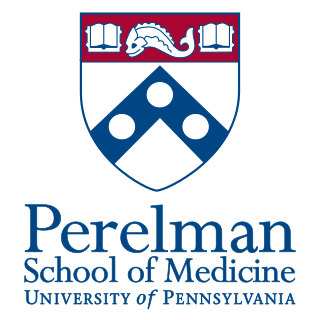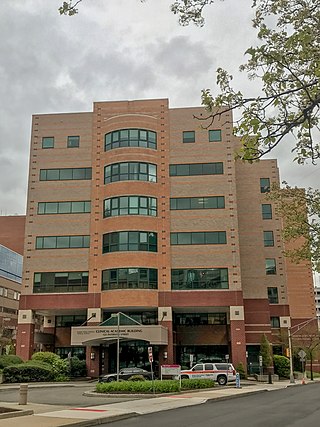Related Research Articles

Alcohol dependence is a previous psychiatric diagnosis in which an individual is physically or psychologically dependent upon alcohol.

The Perelman School of Medicine, commonly known as Penn Med, is the medical school of the University of Pennsylvania, one of seven Ivy League medical schools in the United States. The medical school is based in Philadelphia. Founded in 1765, it was the first medical school in the United States.

Rutgers Robert Wood Johnson Medical School is a medical school of Rutgers University. It is one of the two graduate medical schools of Rutgers Biomedical and Health Sciences, together with New Jersey Medical School, and is closely aligned with Robert Wood Johnson University Hospital, the medical school's principal affiliate.
Shore Regional High School is a regional public high school and school district serving students from four communities in Monmouth County, in the U.S. state of New Jersey. The high school serves students from the constituent municipalities of Monmouth Beach, Oceanport, Sea Bright and West Long Branch, where the school is located. The school is the only facility of the Shore Regional High School District.

Nora D. Volkow is a Mexican-American psychiatrist. She is currently the director of the National Institute on Drug Abuse (NIDA), which is part of the National Institutes of Health (NIH).
Drug detoxification is variously construed or interpreted as a type of "medical" intervention or technique in regards to a physical dependence mediated by a drug; as well as the process and experience of a withdrawal syndrome or any of the treatments for acute drug overdose (toxidrome). The first definition however, in relation to substance dependence and its treatment is arguably a misnomer and even directly contradictory since withdrawal is neither contingent upon nor alleviated through biological excretion or clearance of the drug. In fact, excretion of a given drug from the body is one of the very processes that leads to withdrawal since the syndrome arises largely due to the cessation itself and the drug being absent from the body; especially the blood plasma, not from ‘leftover toxins’ or traces of the drug still being in the system.
Herbert David Kleber was an American psychiatrist and substance abuse researcher. His career, centered on the evidence-based treatment of addiction, focused on scientific approaches in place of punishment and moralisms. His career focused on pathology of addiction to help patients reduce the severe discomforts of withdrawal, avoid relapse and stay in recovery.

Substance use disorder (SUD) is the persistent use of drugs despite the substantial harm and adverse consequences to one's own self and others, as a result of their use. In perspective, the effects of the wrong use of substances that are capable of causing harm to the user or others, have been extensively described in different studies using a variety of terms such as substance use problems, problematic drugs or alcohol use, and substance use disorder.The National Institute of Mental Health (NIMH) states that "Substance use disorder (SUD) is a treatable mental disorder that affects a person's brain and behavior, leading to their inability to control their use of substances like legal or illegal drugs, alcohol, or medications. Symptoms can be moderate to severe, with addiction being the most severe form of SUD".Substance use disorders (SUD) are considered to be a serious mental illness that fluctuates with the age that symptoms first start appearing in an individual, the time during which it exists and the type of substance that is used. It is not uncommon for those who have SUD to also have other mental health disorders. Substance use disorders are characterized by an array of mental/emotional, physical, and behavioral problems such as chronic guilt; an inability to reduce or stop consuming the substance(s) despite repeated attempts; operating vehicles while intoxicated; and physiological withdrawal symptoms. Drug classes that are commonly involved in SUD include: alcohol (alcoholism); cannabis; opioids; stimulants such as nicotine (including tobacco), cocaine and amphetamines; benzodiazepines; barbiturates; and other substances.
Addiction psychiatry is a medical subspecialty within psychiatry that focuses on the evaluation, diagnosis, and treatment of people who have one or more disorders related to addiction. This may include disorders involving legal and illegal drugs, gambling, sex, food, and other impulse control disorders. Addiction psychiatrists are substance use disorder experts. Growing amounts of scientific knowledge, such as the health effects and treatments for substance use disorders, have led to advancements in the field of addiction psychiatry. These advancements in understanding the neurobiology of rewarding behavior, along with federal funding, has allowed for ample opportunity for research in the discipline of addiction psychiatry. Addiction psychiatry is an expanding field, and currently there is a high demand for substance use disorder experts in both the private and public sector.
Henry David Abraham is an American physician. He was a Clinical Professor of Psychiatry at Tufts University School of Medicine in Boston, Massachusetts.

Mark S. Gold is an American physician, professor, author, and researcher on the effects of opioids, cocaine, tobacco, and other drugs as well as food on the brain and behavior. He is married to Janice Finn Gold.
Edward Adam Strecker, M.D. (1886–1959) was an American physician, a psychiatric educator, a professor of psychiatry at several medical schools, and a leader in American psychiatry during the mid-twentieth century.

Charles P. O'Brien is a research scientist, medical educator and a leading expert in the science and treatment of addiction. He is board certified in neurology, psychiatry and addiction psychiatry. He is currently the Kenneth E. Appel Professor of Psychiatry, and vice chair of psychiatry, in the Perelman School of Medicine at the University of Pennsylvania.

Judith L. Rapoport is an American psychiatrist. She is the chief of the Child Psychiatry Branch at the National Institute of Mental Health (NIMH), part of the National Institutes of Health (NIH) in Bethesda, Maryland.
Professor Henrietta Bowden-Jones OBE is a medical doctor, Psychiatrist, Honorary Professor at University College London and Honorary Senior Visiting Fellow, Dept of Psychiatry at Cambridge University.
Katie Witkiewitz is an American psychologist, Distinguished Professor of Psychology at the University of New Mexico in Albuquerque, New Mexico, and Director of the Center on Alcoholism, Substance Abuse, & Addictions, and the Addictive Behaviors and Quantitative (ABQ) Research Lab.
Maria A. Oquendo is an American psychiatrist. Oquendo is the chair of the Department of Psychiatry in the Perelman School of Medicine at the University of Pennsylvania. In 2016, she became the first Latina to be elected president of the American Psychiatric Association.
John F. Kelly is an American-based researcher and professor of addiction medicine at Harvard Medical School. He is the Founder and Director of the Massachusetts General Hospital Recovery Research Institute, Associate Director of the MGH Center for Addiction Medicine, and Program Director of the MGH Addiction Recovery Management Service.

Joseph R. Volpicelli is an American psychiatrist, research scientist, medical academic, and expert in the treatment of addictive disorders. He is Professor Emeritus, Perelman School of Medicine at the University of Pennsylvania. He is board certified in neurology, psychiatry and addiction psychiatry. He currently is Medical Director at Volpicelli Center, an out-patient addiction treatment facility in Plymouth Meeting, Pennsylvania, as well as the Executive Director at Institute of Addiction Medicine, a non-profit research entity also in Plymouth Meeting, Pennsylvania.
References
- 1 2 "Henry Richard Kranzler Curriculum Vitae" (PDF). Mental Illness Research, Education and Clinical Center. 2018-09-24. Retrieved 2021-10-04.
- ↑ "Henry Kranzler, MD". Perelman School of Medicine at the University of Pennsylvania. Retrieved 2021-10-04.
- ↑ "Henry R. Kranzler, MD, Named Director of Penn's Center for Studies of Addiction". Newswise (Press release). 2013-07-26. Retrieved 2021-10-04.
- ↑ "Zindel-Kranzler", Asbury Park Press , January 17, 1980. Accessed October 4, 2021, via Newspapers.com. "Mr. and Mrs. Howard Zindel, here, have announced the engagement of their daughter, Leah Renee, to Henry Kranzler, Highland Park, son of Irving Kranzler, Long Branch, and the late Mrs. Esther Kranzler.... Her fiance is a graduate of Shore Regional High School, West Long Branch, and Monmouth College."